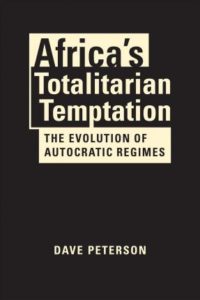The European Union’s foreign policy chief on Tuesday said Sudan’s military rulers have shown an unwillingness to negotiate a peaceful settlement to the country’s ongoing crisis, a day after security forces opened fire on anti-coup protesters in the capital, Khartoum, AP reports. At least seven people were killed (above).
The resignation of (now former) Prime Minister Abdalla Hamdok earlier this month shatters any pretense at legitimacy by Sudan’s ruling military junta. The Sudanese people were never fooled. Their protests, ignited by the Oct. 25 military coup and Hamdok’s initial arrest that hijacked Sudan’s 2 ½-year-old democratic transition, had continued after he was disingenuously reinstated on Nov. 21, argues Dave Peterson, Senior Director of the Africa Program of the National Endowment for Democracy and author of “Africa’s Totalitarian Temptation: The Evolution of Autocratic Regimes.”
It’s time for the United States and others in the international community to stop pulling punches. Statements are not enough. Targeted sanctions, seizure of assets, prosecution by the ICC, and material support for Sudan’s democratic movement are imperative, he writes for Just Security:
The future of democracy as a political system – a priority that the Biden administration has touted, most recently in President Joe Biden’s Summit for Democracy — is at stake. To other coup plotters in Mali, Guinea, Tunisia, Burma, and elsewhere, the message must be unequivocal: The international community can no longer recognize or tolerate those who would take power by military force. RTWT
 The “bedrock” of the democratic opposition’s street movement is the neighborhood resistance committees, says Kholood Khair of Insight Strategy Partners, a Khartoum-based think tank. The committees “are, by and large, made of young people who work within their neighborhoods to bring about a political coalition to unify, effectively, the voice of the street and push for civilian democracy,” she tells NPR:
The “bedrock” of the democratic opposition’s street movement is the neighborhood resistance committees, says Kholood Khair of Insight Strategy Partners, a Khartoum-based think tank. The committees “are, by and large, made of young people who work within their neighborhoods to bring about a political coalition to unify, effectively, the voice of the street and push for civilian democracy,” she tells NPR:
The unfortunate thing with the resistance committees is that while they have been the most active and the most united part of the civilian block, they haven’t really been taken as seriously because they refuse, quite rightly, to become a political party. They refuse to behave in many of the ways that political parties have in Sudan because they see that it’s not going to get them what they want. Political parties typically fragment. They cannot sort of agree to work together. Resistance committees have made that the hallmark of their political approach.







